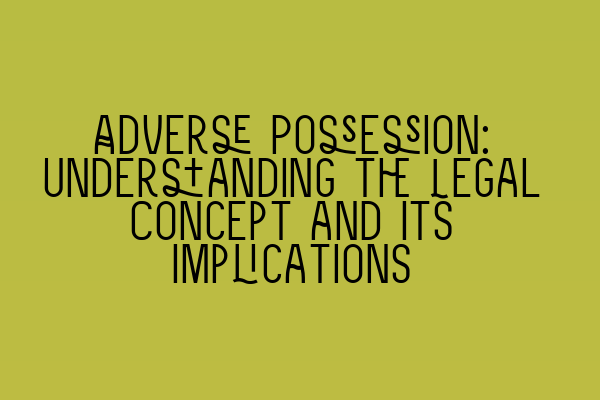Adverse Possession: Understanding the Legal Concept and Its Implications
Welcome to the blog of SQE Property Law & Land Law. In this article, we will delve into the legal concept of adverse possession and explore its implications. Adverse possession refers to the acquisition of someone else’s property through continuous and uninterrupted possession for a specified period of time. It is a complex area of law and understanding its nuances is vital for both property owners and those seeking to claim ownership through adverse possession.
Key Elements of Adverse Possession
Before we discuss the implications, let’s take a look at the key elements that need to be established to successfully claim adverse possession:
- Actual Possession: The claimant must physically possess the property and exercise control over it. Merely having a legal right to access the property is not sufficient.
- Exclusive Possession: The possession must be exclusive to the claimant, meaning that they are the only ones using and occupying the property.
- Open and Notorious Possession: The possession must be open and obvious to anyone who inspects the property. It should not be done in secrecy.
- Continuous Possession: The possession must be continuous and uninterrupted for a specified period of time, typically ranging from 10 to 20 years depending on the jurisdiction.
- Adverse Intent: The claimant must possess the property with the intention of excluding the true owner from its possession.
The Implications of Adverse Possession
Adverse possession can have significant implications for both property owners and those seeking to claim ownership. Let’s explore the implications for each party:
1. Property Owners:
For property owners, adverse possession poses a risk of losing their property if someone successfully claims ownership through adverse possession. It is crucial for property owners to regularly monitor and inspect their property, especially in cases where the property is vacant or unused for long periods of time. By actively monitoring their property, property owners can detect any potential adverse possession claims and take appropriate legal action to protect their ownership rights.
2. Claimants:
For those seeking to claim ownership through adverse possession, the implications are equally significant. Adverse possession provides an opportunity to gain legal ownership of a property without purchasing it. However, it is a complex legal process that requires fulfilling the key elements mentioned earlier. Seek legal advice from a property law solicitor to ensure you have a valid claim and to guide you through the necessary steps.
Protecting against Adverse Possession Claims
To protect against adverse possession claims, property owners can take several proactive measures:
- Regular Inspections: Regularly inspect your property to ensure it is not being unlawfully occupied.
- Documentation: Keep detailed records of your property ownership, including title deeds, surveys, and any relevant evidence indicating your possession and use of the property.
- Boundary Markers: Clearly define and mark the boundaries of your property to prevent any encroachments.
- Communication: If you become aware of someone using or occupying your property without your permission, communicate with them to assert your ownership rights and take legal action if necessary.
By following these measures, property owners can mitigate the risk of adverse possession claims.
Seek Legal Advice
If you are a property owner concerned about adverse possession or someone seeking to claim ownership through adverse possession, it is imperative to seek legal advice from an experienced property law solicitor. Our team at SQE Property Law & Land Law specializes in property law matters and can provide tailored guidance to protect your interests.
To learn more about adverse possession and other property law topics, explore our related articles:
- SQE 1 Practice Exam Questions
- SQE 1 Practice Mocks FLK1 FLK2
- SQE 2 Preparation Courses
- SQE 1 Preparation Courses
- SRA SQE Exam Dates
Thank you for reading our comprehensive guide on adverse possession. For any legal assistance with property law matters, please contact SQE Property Law & Land Law.
